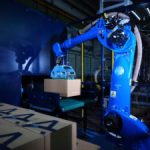Once again, businesses that rely on materials handling equipment (MHE) must get to grips with rising energy costs. Against a backdrop of global supply issues, new legislation and spiralling energy prices, Hoppecke is offering to help UK businesses that rely on MHE to mitigate against rising costs.
As many businesses consider switching from IC engine trucks to an electric-powered fleet, as part of its free energy audit offer, Hoppecke will assess their operation and how it uses equipment to determine the key cost savings to be made using the latest battery technology.
Meanwhile, new UK government legislation, introduced on 1st April 2022, has seen all non-agricultural businesses banned from using red diesel to power their machines, also leading to bigger energy bills. This comes at a time when unprecedented global increases in the cost of white diesel, and in turn LPG gas, are set to send energy costs spiralling ever higher.
Gus Whyte, Sales Director UK and Ireland at Hoppecke, says: “Standard lead acid batteries will suit some operations, whilst others will benefit from lithium-powered systems or other battery technologies that require regular opportunity charging. However, the big issue is recharging and electricity supply costs.
“The world energy market is changing from week to week so we’ve no idea about likely increases. Therefore, irrespective of the technology you choose, it’s vital to appreciate the costs involved in recharging batteries.”
Two key considerations govern the recharging of electric MHE: the amount of power the machine draws during operation and the charger’s percentage of inefficiency. With lithium batteries and regular opportunity charging, the amount of energy returned determines the cost of this energy replacement. It’s also influenced by the kilowatt unit cost of electricity when drawn from the AC mains supply.
Accessing low-cost energy will keep costs down. This means using off-peak time electricity, usually available between 22.00 and 06.00, to your advantage. It’s important because it can cost 28-32% less than electricity consumed at peak rate.
Employing the latest technology also helps to reduce energy bills. For example, Hoppecke say its high efficiency TCHF smart charger is 23% more efficient than a standard low frequency charger, whilst adding the company’s Trak-Air system delivers a further 11% efficiency.
For added flexibility, there’s the TCHF and TCHF Trak-Air system weekly planner. This allows charges to be pre-set individually for every day of the week. No matter what time the charger is connected to the battery, it only operates within the pre-set times, enabling businesses to benefit from full use of lower cost electricity.
Whyte adds: “After the challenges of Brexit and the Covid-19 pandemic this is an especially difficult time for logistics businesses. We’re committed to helping them really understand their energy needs so they can invest in an MHE fleet that will deliver efficiencies as well as key cost savings.”
The post Hoppecke helps tackle rising MHE energy costs appeared first on Logistics Business® Magazine.

